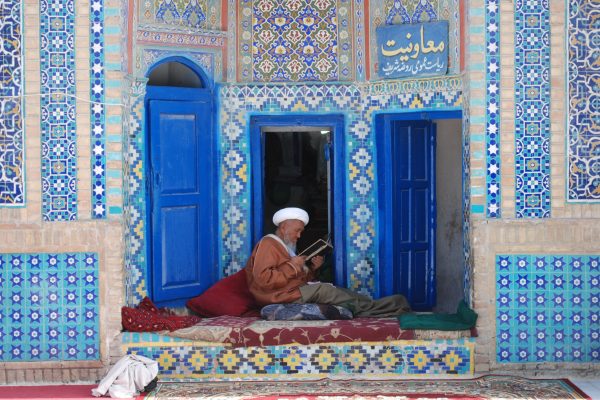Mukhayriq did indeed die that day in battle against the Makkans.
Mukhayriq did indeed die that day in battle against the Makkans.
Ibn Ishaq, the earliest biographer of Prophet Muhammad, relates an amazing story about Rabbi Mukhayriq, a wealthy and learned leader of the tribe of Tha’labah, a Jewish tribe allied with one of the three major Jewish tribes that had lived in Medina for centuries; who fought alongside Prophet Muhammad in the battle of Uhud on March 19, 625 CE, and died in that battle.
That day was a Saturday. Rabbi Mukhayriq had addressed the people of his tribe and urged them to go with him to fight alongside Muhammad. The tribe’s men said that today is the day of Sabbath. According to Halakah (orthodox Jewish Shari’a) , Jews are not supposed to go to war on the Sabbath unless they are directly under attack. The pagan Arabs from Makka would not attack them, they only wanted to persecute the Muslims in Medina as they did for so many years in Makka.
The Torah (Deuteronomy 20:8-10) says: Jewish men who are afraid or disheartened (by thoughts of fighting on the Sabbath) should be told to go home. The Mishnah, the first legal code (Fiqh) of the oral rabbinic Torah states that there are two types of war. A war of defence, which is obligatory for all Jewish adult men, and all other wars, which are voluntary.
Rabbi Mukhayriq chastised the men of his congregation for not understanding the deeper meaning of what was happening; and announced that if he died in the battle, his entire wealth should go to Muhammad. Mukhayriq did indeed die that day in battle against the Makkans.

When Muhammad, who was seriously injured in that same battle, was informed about the death of Rabbi Mukhayriq, Muhammad said, “He was the best of Jews.”
Rabbi Mukhayriq’s view was unorthodox. He must have seen Muhammad as a Prophet of the One God. He also knew Prophet Muhammad had told his Muslim followers to pray facing north toward the site of Solomon’s Temple, although this was later changed to facing south towards Mecca.
Rabbi Mukhayriq also believed that Prophet Muhammad’s total rejection of polytheism would someday lead to the destruction of the 360 idols housed in the Ka’bah; and other polytheistic practices of Jahiliyyah would receive similar treatment. The Arabs were extremely immersed in superstitious beliefs and activities like Tatayyur (belief in omens), Tanjeem (astrology), Tabarruk (seeking blessing from objects) and Kahanah (soothsaying); that had been condemned by Allah 1,800 years before in the Torah of Musa:
“When you enter the land the Lord your God is giving you, do not learn to imitate the detestable ways of the nations there. Let no one be found among you who sacrifices their son or daughter in the fire, who practices divination or sorcery, interprets omens, engages in witchcraft, or casts spells, or who is a medium or spiritist or who consults the dead. Anyone who does these things is detestable to the Lord; because of these same detestable practices the Lord, your God, will drive out those nations before you. You must be blameless before the Lord, your God. The nations you will dispossess listen to those who practice sorcery or divination. But as for you, the Lord, your God, has not permitted you to do so. The Lord, your God, will raise up for you a prophet like me from among you, from your fellow Israelites. You must listen to him.” (Deuteronomy 18:9-15)
The last verse Rabbi Mukhayriq may have applied to Prophet Muhammad. Thus, this unorthodox rabbi viewed fighting alongside Muhammad as his personal voluntary fight in support of monotheism. But, why did Rabbi Mukhayriq give such extraordinary life risking support to Prophet Muhammad? And how could Rabbi Mukhayriq think the verse applied to Muhammad: when it clearly refers to “a prophet like me (Musa)” “from your fellow Israelites”.
Perhaps Rabbi Mukhayriq believed that Prophet Muhammad was not only a Prophet, but was also one of God’s Anointed (a messiah); who with his Arab followers would enable and facilitate the Jewish people’s return to the land of Israel as was predicted in the Bible; just as the Persian King Cyrus the Great; who is called one of God’s Anointed by Prophet Isaiah (45:1 ) had enabled and facilitated the return of Jews to Israel eleven centuries earlier.
The Persian King Cyrus, is mentioned twenty-three times in the literature of the books of the Hebrew Bible. Isaiah refers to this non-Jewish king as God’s “shepherd,” and as the Lord’s “Anointed,” who was destined to facilitate the divine plan.
The fact that the Persians had just a few years previously (614 CE) captured the Land of Israel from the Eastern Roman Empire may, in the rabbi’s mind, have stimulated this belief.
Thus, this unorthodox rabbi viewed fighting alongside Muhammad as his personal voluntary fight in support of monotheism; as well as a witness to his faith in the arrival of one of God’s Anointed Messiahs. Although everyone has heard of the final Son of David Messiah, the rabbis also speak of other pre Messianic Age figures including Elijah and a Son of Joseph Messiah, who will precede the Son of David.
This is not only my view. There is a ninth or tenth century apocalyptic Midrash called “The Prayer of Rabbi Shimon ben Yokhai”, an end of the second century CE well known mystic and visionary, who after 40 days and nights of prayer, had a vision of the Kenites (Byzantine Romans); followed by a vision of the kingdom of Ishmael (the Arabs) who will succeed the Byzantine Romans.
The archangel Mettatron then informed Rabbi Shimon ben Yokhai that: “The kingdom of the Kenites (the future Byzantine Romans) will come to Jerusalem, subdue it, and murder more than thirty thousand in it. Because of the oppression with which they (the Byzantine Romans) oppress Israel (the Jewish People) the Blessed Holy One will send the Ishmaelites (Arabs) against them (the Byzantine Romans) to make war with them, so as to deliver the Israelites from their hand.”
The anonymous author of the “Prayer of Rabbi Shimon ben Yokhai” viewed the replacement of the Christian Byzantine Roman Empire, by the Muslim Arabs, as an act of God; which rescued the oppressed Jewish communities throughout the Near East, and especially in Jerusalem, from Christian Byzantine persecution.
In 614 CE a Persian army, supported by thousands of Persian Empire Jewish volunteers, had captured Jerusalem. This event is referred to in the Qur’an: “The Romans (Byzantines) have been defeated in the nearest land (Syria/Israel). But after their defeat, they will overcome (the Persians) within three to nine years. To Allah belongs the command before and after.” (30:2-4)
In 628 CE the Romans (Byzantines) did recapture Jerusalem, and they massacred all those Jews who had returned to Jerusalem during the period of Persian rule. Yet just one decade later, Arab armies had conquered and displaced the Roman (Byzantine) rulers from Egypt to Iraq.
If Rabbi Mukhayriq had not died fighting alongside Prophet Muhammad in the battle of Uhud; he could easily have lived long enough to see the Arab conquest of Jerusalem, and himself been able to return to live there.
In the following centuries, Jews from Spain to Mesopotamia lived much freer lives under Muslim rule than previous centuries of Christian and Zoroastrian rule. Rabbi Mukhayriq was right in thinking Muhammad would begin a new era in world history. Perhaps his devotion to a Messianic future of peace and brotherhood can inspire Islamic and Jewish religious leaders today to heal past wounds, and make Jerusalem a city of peace for the future.





